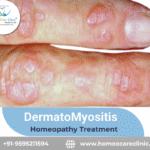What is Psoriasis?
Psoriasis is a chronic autoimmune skin condition that causes the rapid buildup of skin cells, leading to scaling on the skin’s surface. This condition results in patches of red, inflamed skin covered with thick, silvery scales. Psoriasis can occur anywhere on the body, but it most commonly affects the elbows, knees, scalp, and lower back. It is a long-lasting condition that may flare up and subside periodically.
Causes of Psoriasis
The exact cause of psoriasis is not fully understood, but it is believed to be related to immune system dysfunction and genetic factors. Several triggers may cause psoriasis to flare up, including:
- Immune system problems: In psoriasis, the immune system mistakenly attacks healthy skin cells, accelerating the production of skin cells.
- Genetic predisposition: Having a family history of psoriasis increases the risk of developing the condition.
- Infections: Bacterial or viral infections, especially strep throat, can trigger psoriasis flare-ups.
- Stress: Emotional or physical stress may trigger or worsen psoriasis.
- Skin injuries: Cuts, scrapes, or sunburns may trigger a flare-up of psoriasis in that area.
- Medications: Certain drugs like lithium, beta-blockers, and antimalarial medications can worsen psoriasis.
- Weather conditions: Cold, dry weather may cause psoriasis to worsen, while sunny, warm weather may improve symptoms.
Psoriasis Symptoms
The signs and symptoms of psoriasis vary depending on the type and severity of the condition. Common symptoms include:
- Red patches of skin: Inflamed areas covered with silvery-white scales (plaques).
- Itching and burning: The affected areas can be intensely itchy or sore.
- Dry, cracked skin: Skin may become dry and prone to cracking and bleeding.
- Thickened, pitted nails: Psoriasis can affect the nails, causing them to become thick, ridged, or pitted.
- Joint pain: In some cases, psoriasis can be associated with psoriatic arthritis, leading to swollen and stiff joints.
- Scalp psoriasis: Red, scaly patches on the scalp that may extend to the forehead or back of the neck.
Homeopathic Medicines for Psoriasis
Homeopathy offers personalized treatment for psoriasis based on individual symptoms and overall health. Some homeopathic remedies for psoriasis
- Arsenicum Album: Effective for psoriasis with dry, rough, and scaly skin, accompanied by burning and itching sensations that worsen at night.
- Graphites: Suitable for thick, cracked skin with oozing discharge and for cases where psoriasis affects the scalp and nails.
- Sulphur: Used for intense itching, redness, and scaling, particularly when symptoms worsen with heat and washing.
- Sepia: Ideal for women with psoriasis during hormonal changes, such as pregnancy or menopause, and when symptoms include dry, rough skin.
- Calcarea Carbonica: Beneficial for individuals with psoriasis who experience excessive sweating, fatigue, and sensitivity to cold.
- Natrum Muriaticum: Recommended for dry, scaly skin with itching, especially in areas exposed to the sun, and when triggered by stress or emotional factors.
* Note – Above medicines are for knowledge purpose only. Take the medication only after doctor’s consultation. DO NOT SELF MEDICATE
Homeopathic Treatment for Psoriasis
Homeopathic treatment for psoriasis is holistic, aiming to address the root cause of the condition rather than just treating the symptoms. The main goals of homeopathic treatment are:
- Reduce skin inflammation and scaling: Homeopathic remedies help to decrease the severity of skin lesions and prevent new ones from forming.
- Improve skin texture: Remedies work to heal cracked, thickened, or dry skin.
- Manage stress and triggers: Since stress is a common trigger for psoriasis, homeopathy also helps in balancing emotional health and reducing stress.
- Boost immune function: Homeopathy strengthens the immune system to prevent autoimmune reactions that lead to psoriasis flare-ups.
Prevention of Psoriasis Flare-ups
Although psoriasis cannot be completely prevented, there are ways to minimize flare-ups and manage the condition effectively:
- Moisturize regularly: Keeping the skin hydrated helps reduce dryness and scaling.
- Avoid skin injuries: Be cautious of cuts, scrapes, or sunburns, as they can trigger psoriasis.
- Manage stress: Practice relaxation techniques like yoga, meditation, or deep breathing to reduce stress levels.
- Avoid certain medications: Consult your doctor about medications that may worsen psoriasis and explore alternatives if needed.
- Limit alcohol consumption: Excessive alcohol intake can trigger or worsen psoriasis.
- Sunlight exposure: Controlled exposure to sunlight can help reduce symptoms, but avoid overexposure to prevent sunburn.
FAQs
- Can homeopathy cure psoriasis ?
Homeopathy focuses on managing the condition and reducing the frequency and severity of flare-ups. While it may not cure psoriasis permanently, it can offer long-term relief.
- How long does homeopathic treatment for psoriasis take?
The duration of treatment varies for each individual, depending on the severity of the condition. Some may experience improvement within a few months, while others may need longer treatment.
- Is homeopathic treatment safe for psoriasis?
Yes, homeopathic remedies are natural and safe, with minimal to no side effects, especially when prescribed by a qualified homeopath.
- Can homeopathy be used along with conventional treatments for psoriasis?
Yes, homeopathic remedies can be used alongside conventional treatments, but it’s important to consult both your homeopath and doctor to avoid any interactions.
- What are the triggers for psoriasis flare-ups?
Common triggers include stress, skin injuries, infections, certain medications, and changes in weather, especially cold and dry conditions.
Homeo Care Clinic offers a holistic approach to treating the disease. The remedies mentioned above can treat the underlying causes of the condition and offer relief from the discomfort. However, it is important to consult a qualified homeopathic practitioner for the correct dosage and duration of treatment. Homeo Care Clinic provides comprehensive care for various ailments, and offers customized treatment plans based on individual requirements.
To schedule an appointment or learn more about our treatment, please visit our website or give us a call
+91 9595211594 our best homeopathy doctor will be here to help.
Follow us on Facebook, Twitter, and Instagram for valuable insights into the world of homeopathy and holistic health.
Facebook –
https://www.facebook.com/homeocareclinicpune
Instagram –
https://www.instagram.com/homeocareclinic_in
Website –
https://www.homeocareclinic.in
Success Stories of Patients – homeocareclinic.in/category/case-study
YouTube Patient Review – https://www.youtube.com/playlist?list=PL__SnPQCl4WLPFV7iJOdQxn4YaB6IkPHJ
LinkedIn –
linkedin.com/company/homeo-care-clinic
Chat with a best homeopathic doctor privately
If you have any queries regarding your disease or any symptoms
, click to send a WhatsApp message. Our
best homeopathy doctor will be happy to answer you.
Book an Appointment
If you want to visit our clinic,
click to book an appointment.
Online treatment
If you are a busy professional, or you are living in a remote town or city, with no best homeopathic doctor near you
, Click to start an online homeopathic treatment with the world’s exclusive, most experienced and best homeopathic clinic, managed by
Dr. Vaseem Choudhary world-renowned homeopathic doctor expert







